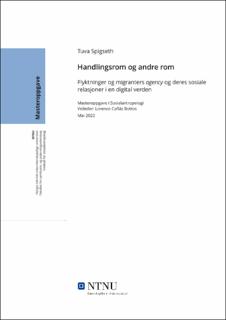| dc.contributor.advisor | Cañás Bottos, Lorenzo | |
| dc.contributor.author | Spigseth, Tuva | |
| dc.date.accessioned | 2022-07-27T17:19:39Z | |
| dc.date.available | 2022-07-27T17:19:39Z | |
| dc.date.issued | 2022 | |
| dc.identifier | no.ntnu:inspera:108359213:22725904 | |
| dc.identifier.uri | https://hdl.handle.net/11250/3008928 | |
| dc.description.abstract | Denne avhandlingen tar utgangspunkt i flyktninger og migranters opplevelser med å kommunisere og dele et liv med familie som er værende i deres opprinnelsesland gjennom mobiltelefonen. Avhandlingen viser historier og opplevelser fra noens flukt og hverdagen på asylmottak med mobiltelefonen i hånden, og kommunikasjon med familie i ens videre hverdag i Norge. Jeg ønsker å fremlegge en forståelse av en digital sameksistens når man som flyktning eller migrant lever i en annen sosial virkelighet enn sine familier, og avhandlingen vil belyse hvordan de forholder seg til ulike strukturelle forhold samtidig under kommunikasjon. Empiriske funn sees i lys av Giddens (1979) og Bourdieu (1977) sine teorier som bygger bro mellom individuell handling og strukturelle forhold.
Bourdieu sitt habituskonsept brukes som analytisk verktøy for å utforske flyktninger og migranters livserfaringer og vaner fra fortiden, og hva som kan skje med ens habitus når man flytter på seg og kommuniserer med familie på tvers av landegrenser. Med Giddens’ agency-begrep utforskes deres handlefrihet og handlingsrom i kommunikasjon med familie. Habitus og agency sees i sammenheng med hvordan et nettverkssamfunn (Castells, 2004) med familie kan forstås å utspille seg. Nettverkssamfunnene preges av et fysisk fravær blant dem og familiene deres. Avhandlingen ønsker dermed å være et bidrag til Anthropology of Absence (Billie et al., 2010). I nettverkssamfunnene dukker det opp handlingsrom og ”andre rom”. ”Andre rom” viser til det som oppleves som ikke-kommuniserbart gjennom mobiltelefonen. Jeg argumenterer for at sosiale relasjoner tar en ny form når kommunikasjon foregår digitalt og de ikke lenger går på samme sti med familiene sine. Nettverkssamfunnene forstås å være preget av strukturelle kontekst-kollapser, og forskningsdeltakere entrer nettverkssamfunnet med å ta visse beslutninger i et kommunikativt rom. Deres handlinger i nettverkssamfunnene forstås som et søk etter åpne handlingsrom, både i en digital og fysisk omstendighet.
Avhandlingen baserer seg på et seks måneders feltarbeid som frivillig i en hjelpeorganisasjon sitt lokale i Trondheim, som er en møtearena for migranter. Organisasjonens målgruppe er flyktninger, asylsøkere og arbeidssøkende. Empiri er samlet inn gjennom intervjuer og deltakende observasjon. | |
| dc.description.abstract | This thesis is based on refugees and migrants’ experiences of communicating and sharing a life with family remaining in their country of origin, through the mobile phone. Through their stories and experiences from the escape and everyday life at the asylum reception center with a mobile phone close at hand, and through communication with family in one’s further everyday life in Norway, I present an understanding of a digital coexistence between refugees and migrants and their families who live in a different social reality. The thesis will highlight how they relate to different structural conditions while communicating with family. Empirical findings are seen in light of Giddens’ (1979) and Bourdieu’s (1977) theories that build a bridge between individual action and structural conditions.
Bourdieu’s habitus concept is used as an analytical tool to explore refugees and migrants’ life experiences and habits from the past, and what can happen to one’s habitus while migrating and communicating with family across national borders. With Giddens’ agency concept their freedom of action and room for maneuver are explored in communication with family. Habitus and agency are seen in context of how a network society (Castells, 2004) with family unfolds. A physical absence among research participants and their families characterize the network societies. Therefore, the thesis wishes to contribute to an Anthropology of Absence (Billie et al., 2010). In these network societies space for action as well as “other spaces” appears. “Other spaces” refer to what is perceived as non-communicable through a mobile phone. I argue that social relationships take a new form when communication takes place digitally, and they no longer walk on the same path as their families. Network societies are affected by structural context collapses, and research participants enter the network society by making certain decisions in a communicative space. Their actions in the network society are understood as a search for open spaces of action, both in a digital and physical circumstance.
The thesis is based on a six months fieldwork working as a volunteer in an aid organization, which creates a meeting arena for migrants in Trondheim. The organizations target groups are refugees, asylum seekers and jobseekers. Empirical data is collected through interviews and participatory observation. | |
| dc.language | nob | |
| dc.publisher | NTNU | |
| dc.title | Handlingsrom og andre rom: Flyktninger og migranters agency og deres sosiale relasjoner i en digital verden | |
| dc.type | Master thesis | |
